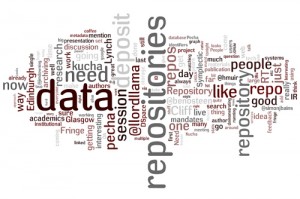Photo by “Clairity“, via Flickr, used under CC License.
I am currently moderating a discussion at a conference. I’m not being rude and ignoring the participants as I write this post - the conference session is a virtual one and taking place online, via a message board. Instead, I’m carrying on with other tasks and also monitoring the discussion.
The e-conference - “Learning Repositories in Agriculture Food & Environment: Quality Promises &
Considerations in Learning Repositories and Portals (AgLR 2010)”, is being run by which Agricultural Learning Repositories Task Force (AgLR-TF) and the e-Agriculture Community. It starts today (6th October) and runs until 20th October. It’s open to anyone with an interest in learning-based repositories and portals, and although the subject is agricultural resources, the discussions are always more generally applicable to services in other subject areas too.
I’m co-moderating a session in week one (this week), with Jackie Wickham of the RSP. The topic we are looking at is metadata, and to start off the discussion participants are being asked to consider four questions and post their responses -
1. Have you described in the past, your learning resources using metadata (description, title, keywords, tags, etc)? Which are the metadata elements that you mainly use?
2. Do you feel that providing metadata for resources is useful? What are the incentives that drive you, to provide the metadata?
3. What constitutes high quality metadata for a resource? Is it completeness for all metadata elements? Is it the clarity and correctness of the language used? Other aspects?
4. What are the benefits you see in providing metadata for learning resources in practice?
I’ve never taken part in an e-conference before, so I’m quite excited! Being an e-conference, potentially we will be able to have input from across the world, which is quite a thought. Also, with travel budgets being cut in even the most well-off countries and organisations, I’m keen to see if e-conferencing offers a way to get more people involved in a discussion, and help to open up an event to people who may not usually be able to afford either the time or cost of travelling to a face-to-face meeting.
The virtual environment also means that the discussion can, potentially, run for a full working week. I’m interested to see if this encourages more people to contribute to the discussions, because they can do so at a time and a place that is convenient for them.
The e-conference started at 1pm GMT, so has not been underway for very long. You can sign up and join in here , just follow the link in the left menu to register.
And I’d like to know what you think of this was of running a conference. Would it work for you? Have you participated in an e-conference before? Would you consider signing up for this kind of online event? Let me know what you think!






